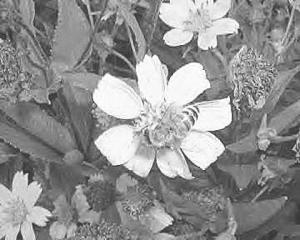2005 - Volume #29, Issue #2, Page #08
[ Sample Stories From This Issue | List of All Stories In This Issue | Print this story
| Read this issue]
New Cash Crop Looking For Growers
 |
Page has developed two new varieties of the small-seeded, bee-pollinated crop. For the past five years, he has been working with growers to identify where and how to grow it commercially.
Niger has an attractive yellow flower and attracts both the birds and bees when planted around a house or garden. When cultivated on a large scale, the seed is harvested as bird food.
"I think niger seed could be grown as a second crop after winter wheat in double crop areas or after peas in the upper Midwest," says Page.
So far, the best producers have achieved yields as high as 700 lbs. per acre.
Often marketed as niger thistle seed, it is neither a thistle nor does it tend to self-seed like common weeds. Niger is related to the aster family that includes asters, mums, daisies and sunflowers. Page has two varieties - one matures in 110 days from planting and reaches 4 to 5 ft. in height. The other matures in 90 days and reaches 2 to 3 ft. in height. Like the sunflower, the niger produces yellow flowers. Page has counted as many as 400 small yellow blossoms on a single plant. He reports they are covered with bees when in blossom and attract birds by the hundreds when in seed.
"In Ethiopia where it originated, it is known as the honey crop," says Page. "I am getting a lot of interest in it as an inexpensive fall bee pasture when seeded in small grain stubble as a second crop."
Page's niger seed grows well over a wide area. He reports one customer doing well with it in England, while his best Canadian grower farms 50 miles north of Winnipeg, Manitoba.
"Niger seems to do better in drier areas or when grown in rows in wetter areas where it can dry out," says Page. "It also appears to be a low input crop, as North Dakota State University test plots showed no response to nitrogen application."
Page sells his niger seed by the packet (1,500 seeds) for gardeners, as bird feed in 4-lb. and larger bags, and in larger quantities for commercial production. Prices range from $5 for a seed packet to $21 for two 4-lb. bags of bird feed. He warns that it is illegal under the Plant Variety Protection Act to save his niger seed for sale or for increased field production. Gardeners can save their seed for personal use.
Contact: FARM SHOW Followup, Glenn Page, 4351 Mackey Ave., St. Louis Park, Minn. 55424 (ph 952 926-1364; email: gpage50@netscape.com; website: www. nyger.com).

Click here to download page story appeared in.

Click here to read entire issue
To read the rest of this story, download this issue below or click here to register with your account number.




